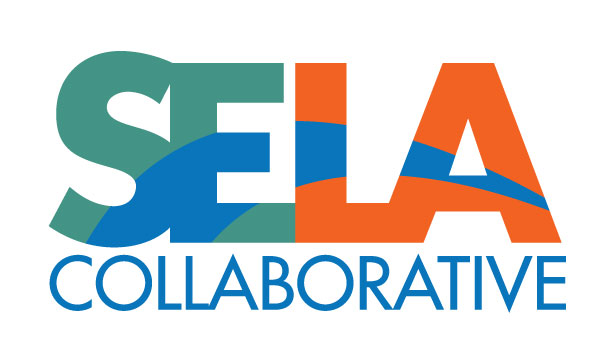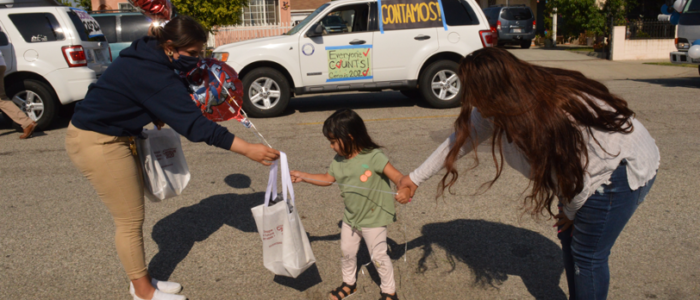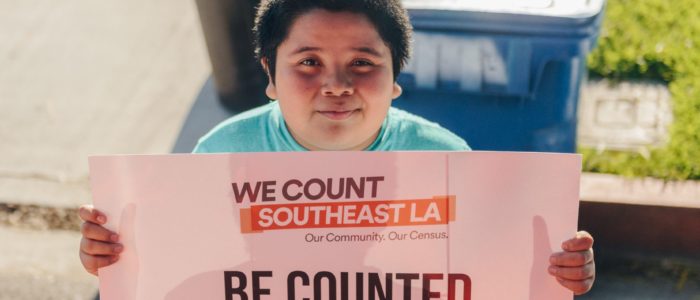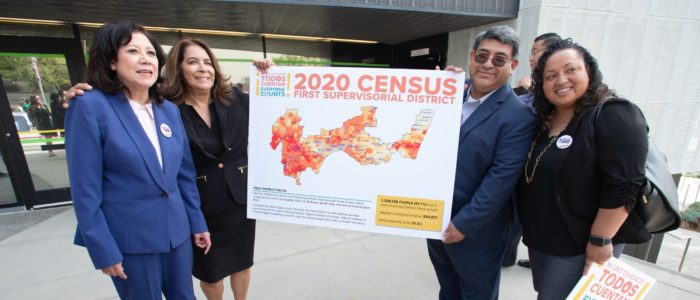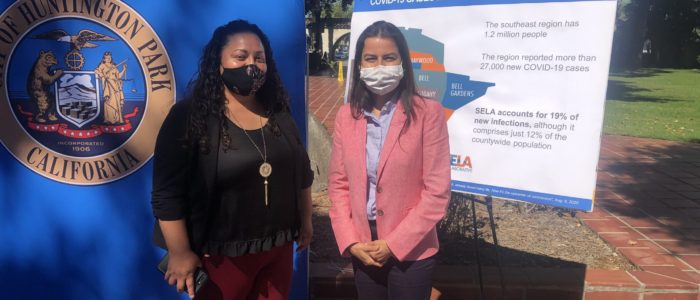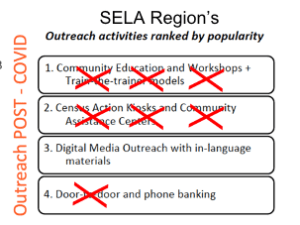Since 2018, the SELA Collaborative has engaged residents, community-based organizations (CBOs), cities, elected offices, resident grassroot groups, small businesses, schools and the Census Bureau to ensure a full count of SELA residents in the 2020 Census.
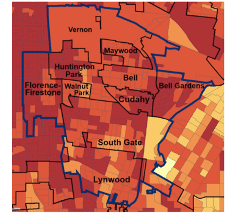
Challenge
SELA Region is Hard-to-Count (HTC)
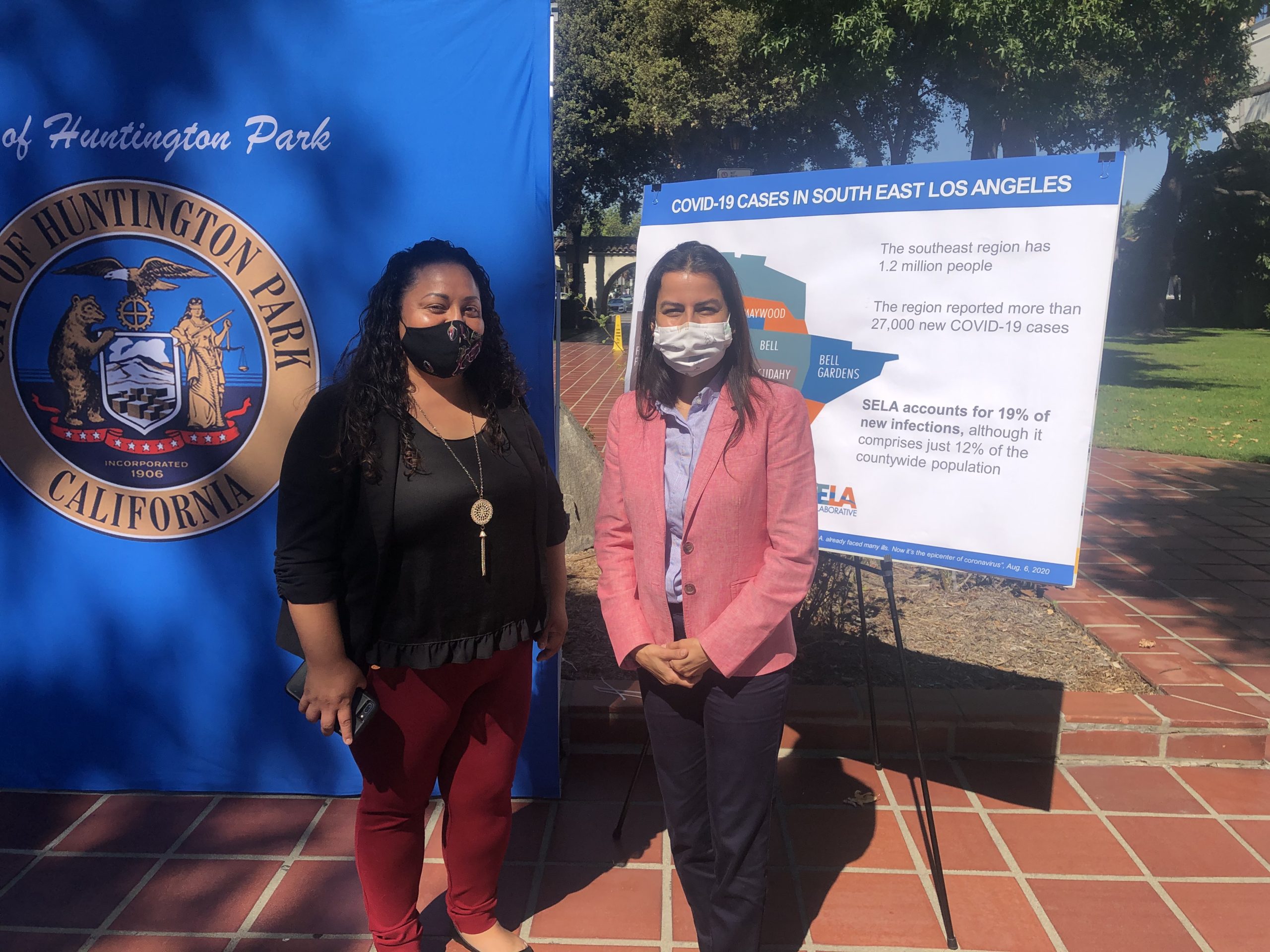
SELA's Role
The SELA Collaborative’s role has focused on creating spaces to convene diverse organizations, offices, and agencies to collectively strategize SELA Census outreach.

COVID-19
March 13, 2020 “stay at home” orders were issued and the planned Census outreach strategies for SELA, were paused.
Challenge
In 2010, the SELA region experience low-response rates (meaning low participation in Census 2010) which impacted the amount of federal resources our communities received. This map clearly signaled that if the region aspired to attain a complete count in 2020, SELA Census outreach stakeholders would have to coordinate with one another in unprecedented ways.
For 2020, the region had been identified to be “hard or very hard to count” given its demographic profile: large immigrant, limited English speaking, 0-5, renter, low income Latino/a/x community. Deep understanding of this context allowed the diverse network of SELA Census outreach partners to identify core tactics and bilingual activities to educate, activate, and participate in 2020 Census.
SELA Collaborative’s Role in the Southeast LA Region
The SELA Collaborative’s role has focused on creating spaces to convene diverse organizations, offices, and agencies to collectively strategize SELA Census outreach. From the bilingual charlas in 2018 to learn directly from residents what their main concerns are to providing access to critical Census 2020 campaign updates by convening the region within both the Los Angeles Regional Census Table (LARCT) to educate partners and its evolution to the We Count LA Campaign to coordinate one another, the SELA Collaborative has coordinated multiple partnerships through an ethos of inclusion and transparency.
This means leaning into our unique role in this countywide campaign to elevate our partners direct outreach activities in, highlighting organizations’ efforts via earned and paid media opportunities, and continuously representing the innovative regional work at the local, state, and national level.
The Coronavirus 19 Pandemic
On March 12th, 2020, the We Count LA table mobilized its eight regional co-conveners for a press conference to launch the start self-response period for 2020 Census. One day later, “stay at home” orders were issued and the planned Census outreach strategies for SELA, were paused.
SELA Nonprofits = Regional Social Safety Net
The nonprofit sector in the SELA region has continuously served as a critical safety net to thousands of SELA residents. Nonprofits understand the undeniable relationship between public resources and regional wellbeing. During COVID, SELA nonprofits learned to quickly balance responding to direct community needs such as food, healthcare, income, and basic necessities with the compassion to also encourage 2020 Census participation. This has been no easy feet as nonprofits, along with other regional stakeholders, learned to swiftly and creatively engage with community remotely.
At large, some of the most important learning lessons for the SELA Collaborative are:
Learning Lessons
Build the Infrastructure: Identify an organization who can lead cross-sector convenings
Why: The organizing agency leads others by sharing information, explaining the campaigns’ progress, growing the community, and explaining what work is being done. This leads to: coordination, network building, and collective contributions.
Highlight: SELA Collaborative served as regional co-convener for the We Count LA Table (formally known as LARCT) setting into place a structure that supports a strong regional network for civic engagement work.
Promote National Visibility: Leverage partnerships to bring visibility to the needs and assets to the SELA region
Why: Transforming the narrative that SELA is a nonprofit poor region and countering the infamous reputation of having “corrupt” cities is critical in bringing in resources and partnerships that uplift SELA and the assets of the region.
Highlight: SELA Collaborative, City of South Gate, and NALEO Census Train-the-Trainer Series in February 2020 elevate SELA region as a community organized to promote 2002 Census targeting city staff across Los Angeles County
Elected Office Partnerships with the Nonprofit Sector bring power to the SELA region
Why: Nonprofits play a critical role in our community’s social safety net and need support at both the state and federal levels to advocate for resources and their value.
Example: SELA Collaborative led the 2002 Census Convening in partnership with Office of Assembly Anthony Rendon and Senator Lena Gonzalez, Elected Roundtable Jan 2020
